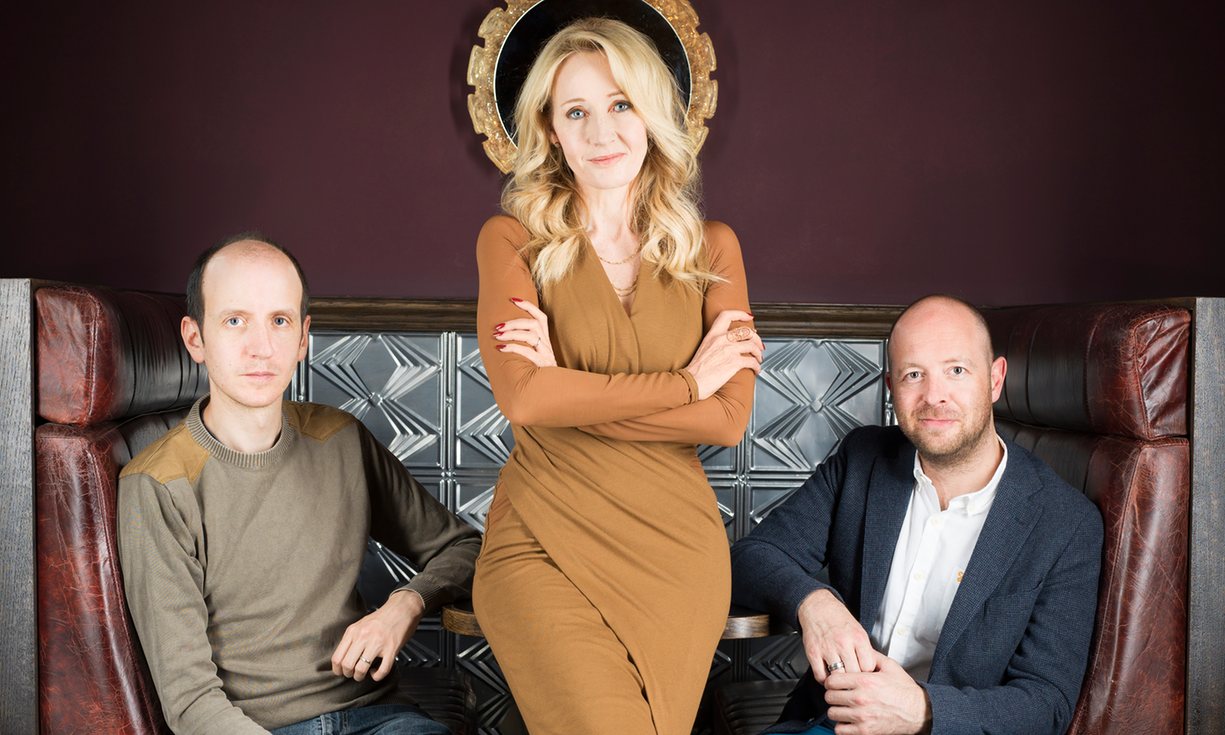
In a new interview with The Guardian J.K. Rowling, along with director John Tiffany and playwright Jack Thorne, discusses the upcoming Harry Potter and the Cursed Child play. Even the interviewer admits that we don’t learn much new information on the play, but that doesn’t mean there isn’t valuable information in the interview:
Even in this, the only interview Rowling, Tiffany or Thorne will give before the show opens, a voluntary vow of silence about the plot is observed. “The epilogue of the seventh book is a very clear pointer as to where I was interested in going,” Rowling offers, slowly. “It’s very obvious from that epilogue that the character I was most interested in was Albus Severus Potter. And you see Scorpius on that platform.” She sits back, smiling, Sphinx-like.
Most of the interview details the friendship that has formed between Rowling, Thorne and Tiffany since beginning work on the play as well as how they all met. Rowling also points out that Thorne is the main writer for the script of the play:
“From the moment he produced the first outline, I thought bingo, that’s it.” Did she never imagine writing the play herself? After all, her other major project this year is her debut screenplay for the film Fantastic Beasts and Where to Find Them, telling of the adventures of Newt Scamander in 1920s New York, decades before Harry Potter reads his book at school.
“I am not so arrogant that I think when you’ve got an absolutely top-class playwright offering to do it that I’m going to say, ‘Well, I’ve never done it before but I’ll do it.’ It’s a question of knowing the limits of your own competence. I was reasonably involved in the Potter scripts. I’m more familiar with that world. I felt a degree of confidence writing a screenplay but I had supreme confidence that Jack was going to write the play that I was going to love and he has. So you can’t ask fairer than that.”
[…]
“It is a totally new language to me,” she says. “So watching Jack and what he can do on the page and his understanding on what will then translate on to stage has been such a revelation to me. I know novels and I know movies but this is a different world entirely. Jack has access to a paintbox that I don’t have because I don’t understand the medium.”
Rowling also discusses how she has never really left Potter in her own mind and if she’ll continue working in that world:
“It was 17 years and just because I’ve stopped on the page doesn’t mean my imagination stopped,” she says. “It’s like running a very long race. You can’t just stop dead at the finishing line. I had some material and some ideas and themes, and we three [she nods at Tiffany and Thorne] made a story.”
It has been almost a decade since she put pen to paper for the final book in the sequence. “But I carry that world around in my head all the time,” she acknowledges. “I am never going to hate that world. I love that world. But there are other worlds I want to live in too. To be perfectly honest, I just feel if I enjoy it, I’ll do it – and if I don’t, I won’t.”
In fact, with the play and the screenplay, 2016 has turned out to be what she describes as “such a wizardy year”. “I always said never say never, and the reason I said that was truthfully that I did have this residue in my head in both directions – in Fantastic Beasts…, which is going back, and in this play, which is going forwards. So I still had this material in my head.
“It’s been amazing because there are roots over there and shoots over here, so it is keeping it very consistent and doing it all at the same time. We are sharing a lot between the worlds.”
They also discuss the backlash from casting a non-white actress to play Hermione.
“With my experience of social media, I thought that idiots were going to idiot,” she says. “But what can you say? That’s the way the world is. Noma was chosen because she was the best actress for the job. When John told me he’d cast her, I said, ‘Oh, that’s fabulous’ because I’d seen her in a workshop and she was fabulous.”
Unknown to Tiffany, when he made his casting call, there had in fact been a “black Hermione” theory around in Potterworld for years. Yet the strength of reaction surprised him. “I am not as Twitter familiar as Jo and Jack, so I hadn’t encountered its dark side, which is just awful,” he says. “The anonymity breeds horrors so after a while I stopped reading it. But what shocked me was the way people couldn’t visualise a non-white person as the hero of a story. It’s therefore brilliant that this has happened.”
Rowling agrees. She says there was always the possibility of Hermione being black in the way she was described; skin colour was never mentioned.
Harry Potter and the Cursed Child begins previews this coming week and opens on July 30th. Tickets to the play may be purchased on the play’s website.
Filed Under: Other Potter Related |


